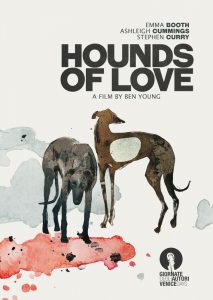 Hounds of Love ★★★★
Hounds of Love ★★★★
IN Hounds of Love, Western Australia has produced a devastatingly good companion piece to Snowtown.
The 2011 drama based on the Snowtown killings was the darkest Australian film since Wake in Fright and sent its director, Justin Kurzel, to Hollywood (Macbeth and Assassin’s Creed).
Hounds of Love will do the same for first-time director Ben Young and star Emma Booth. You will also never look at Australian comic actor Stephen Curry the same way again.
Exploring the depths of a disturbing relationship between a serial-killing couple and one of their victims, Hounds of Love will be a difficult sell to mainstream audiences.
But, in addition to being admirable film-making, unlike Snowtown it does at least provide a small glimpse of humanity and hope rising from the torture and depravity.
The film has obvious links to the infamous Birnies’ case, but the film-makers insist it is not based on those people or their crimes. Nevertheless, they are very specific in depicting events that take place in and around a non-descript suburban Coolbellup home in December of 1987.
The opening super slow-motion shot of the couple sitting in their car watching some neighbourhood girls playing netball is masterful in establishing the tone and style of the film.
When the couple entice a lone girl into their car for a lift a palpable sense of dread spreads through the cinema audience. That sense will at times be further shredded by some of the film’s toughest sequences, many of which assault the mind when the camera chooses to pull away from the worst excesses.
Throughout the film we are given clues as to the unfolding narrative, not just in depicting whether the killers will be stopped but, more importantly, how their own relationship ebbs and flows.
We know, based on notes on power poles and the police station wall, that several girls are missing, but these do not seem to have created wider concern among the authorities or community.
When another girl is taken, apart from her family’s efforts to locate her, we are left to follow the story of young Vicki, chained to a bed in a boarded-up room on a urine-stained mattress, awaiting her fate at the hands of husband and wife predators, John and Evelyn White.
Like several other comic actors before him, Stephen Curry’s casting as John White is very good because it subverts both our idea of not only Curry’s public persona but also that of a vile murderer.
As the producer said in a Q&A held in Perth, audiences had to believe that a girl would get into a car with John and Evelyn White. Even though Evelyn does most of the talking for these encounters, Curry perfectly hits every note in helping put them at ease by not appearing threatening in any way.
Ashleigh Cummings, as Vicki, gives a harrowing performance as the young victim whose inner strength helps expose some of the cracks in the White’s relationship while she tries to survive.
As for Emma Booth, this is the performance of her career to date and will result in many strong roles, much the same as another great Australian drama, Animal Kingdom, did for Jackie Weaver a few years ago.
The character of Evelyn White is incredibly complex and the script requires both actress and audience to somehow work together in getting beneath her callous, unflinching skin to a deeper, vulnerable place.
Without this occurring, the film would probably fall apart. To Booth’s and Young’s credit (he also wrote the film) it achieves everything it sets out to do.
It sounds like this is a perfect film, but I have a few small quibbles with the acting and story that unfolds outside the central location with the Whites and Vicki. The final scene of the film is also a miss-step, tonally at odds with the rest of the film.
Overall, this is a significant achievement in WA cinema history, taking its place with Snowtown and Animal Kingdom as a minor dramatic classic.